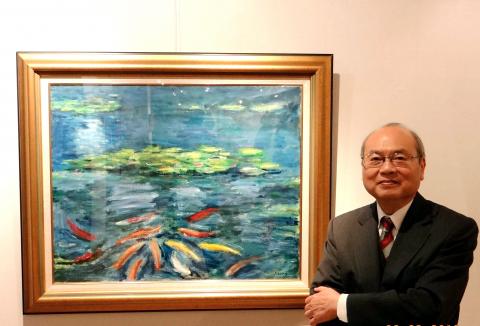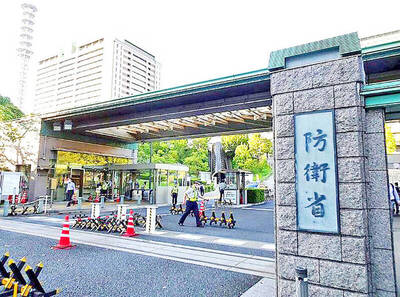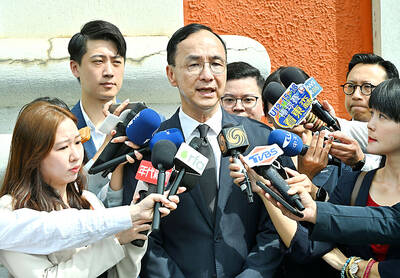Winning a UNESCO award for heritage conservation may be enough for some, but Liao Wu-jyh (廖武治), president of the 271-year-old Dalongdong Baoan Temple in Taipei’s Datong District (大同), has pledged to continue his efforts to turn the temple into a sustainable site combining religious culture with art.
Baoan may not be the oldest temple in the nation, but Liao, its administrator, was one of the recipients of a UNESCO Asia-Pacific Award for Cultural Heritage Conservation in 2003 in recognition of his seven years of hard work to renovate the temple.
In addition to being a veteran temple administrator, Liao is an amateur painter whose works have been exhibited in the Taipei Cultural Center.

Photo: Weng Yu-huang, Taipei Times
Liao was an apprentice to the late Taiwanese master painter Chang Wan-chuan (張萬傳) when he was 18 years old. He converted to Buddhism at the age of 36 under the guidance of Master Sheng Yen (聖嚴法師).
Liao’s love of art has profoundly influenced his religious philosophy, as well as his later career as a temple head.
“As Master Sheng Yen once said: ‘All great artists and great religions throughout the history of the world are inseparable from each other, with the former seeking inspiration for their works from religion and the latter passing down its spirit via the perpetuation of art,’” Liao said.
Liao twice served as a board director of the temple, from which he resigned because of disagreement over the temple’s administration.
However, Master Sheng Yen’s teachings that Liao “go along with the flow, but not with the one tainted” and to “treat the temple as his own monastery” encouraged him to return to the temple.
Since then, Liao has endeavored to steer the temple toward becoming a center for education, culture and social welfare, as he moved up from secretary-general to the top as the president.
The temple was built in 1742 and reconstructed in 1805. To restore the temple, which had been damaged by time, weather and termites, to its former glory, Liao drew on his artistic expertise to start renovations of the site in the 1990s.
The renovations were financed solely by self-solicited funds, Liao said.
Following his studies of the temple’s history, Liao spared no effort to preserve every aspect of the site, from its architectural layout and displays of ornamental trees to its art installations and decorations.
Thanks to Liao’s endeavors, a series of murals on the two sides of the temple’s main hall created in 1974 by the late Taiwanese temple painter Pan Li-shui (潘麗水) were preserved.
Many dilapidated roof shingles and columns were repaired using their original materials, to preserve their historic style.
In 2000, Liao took another step to incorporate a humanistic and artistic flavor into the temple, by transforming the annual birthday celebration of Baoshengdadi (保生大帝, also known as the God of Medicine) into a cultural festivital.
He also sought to facilitate exchanges with different religions overseas to add more cultural value to the nation’s traditional religious beliefs.

LOOKING NORTH: The base would enhance the military’s awareness of activities in the Bashi Channel, which China Coast Guard ships have been frequenting, an expert said The Philippine Navy on Thursday last week inaugurated a forward operating base in the country’s northern most province of Batanes, which at 185km from Taiwan would be strategically important in a military conflict in the Taiwan Strait. The Philippine Daily Inquirer quoted Northern Luzon Command Commander Lieutenant General Fernyl Buca as saying that the base in Mahatao would bolster the country’s northern defenses and response capabilities. The base is also a response to the “irregular presence this month of armed” of China Coast Guard vessels frequenting the Bashi Channel in the Luzon Strait just south of Taiwan, the paper reported, citing a

A total lunar eclipse, an astronomical event often referred to as a “blood moon,” would be visible to sky watchers in Taiwan starting just before midnight on Sunday night, the Taipei Astronomical Museum said. The phenomenon is also called “blood moon” due to the reddish-orange hue it takes on as the Earth passes directly between the sun and the moon, completely blocking direct sunlight from reaching the lunar surface. The only light is refracted by the Earth’s atmosphere, and its red wavelengths are bent toward the moon, illuminating it in a dramatic crimson light. Describing the event as the most important astronomical phenomenon

ENHANCING DETERRENCE: Stationing the missiles in Kyushu would allow Japan to cover waters near Taiwan and China’s coastal areas without any logistical difficulties Japan is to deploy extended-range anti-ship missiles at a Ground Self-Defense Force base in Kumamoto to bolster its defenses, the Yomiuri Shimbun reported on Saturday. The upgraded Type 12 surface-to-ship missile, with a range of more than 1,000km, would be capable of striking targets in the Taiwan Strait and along China’s coast. Originally limited to a few hundred kilometers, the Type 12 was recently modernized ahead of schedule. Deployment, initially slated for next year, has been accelerated after the upgrade was completed sooner than expected, the newspaper said. Stationing the missiles in Kyushu would allow Japan to cover waters near Taiwan and

The presence of Taiwanese politicians at China’s military parade tomorrow would send the wrong message to Beijing and the international community about Taiwan’s sovereignty and democracy, a national security official said yesterday. China is to hold the parade tomorrow to mark the 80th anniversary of Japan’s surrender in World War II. By bringing together leaders of “anti-West” governments such as Russia, North Korea, Iran and Belarus, the parade aims to project a symbolic image of an alliance that is cohesive and unbending against Western countries, the national security official said, speaking on condition of anonymity. Former Chinese Nationalist Party (KMT) chairwoman Hung Hsiu-chu